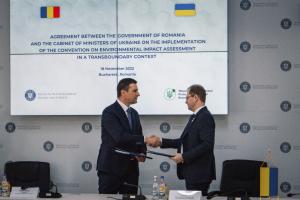
Environmental impact assessment (EIA) in a transboundary context, along with strategic environmental assessment (SEA), have an important role to play in climate proofing and in helping countries to achieve a sustainable and green post-COVID-19 economic recovery. EIA and SEA are also expected to be of fundamental importance during Ukraine’s post-war reconstruction.
Bilateral agreements, which are provided for in article 8 of the Convention on Environmental Impact Assessment in a Transboundary Context (Espoo Convention), help reconcile national legislative procedures, address differences in implementation practices and enable environmental ministries to coordinate transboundary EIA procedures more effectively. Their use is a practical and recommended way for the contracting Parties to the Espoo Convention that expect to have transboundary environmental impact assessments on a regular basis to agree on key implementation issues in advance.
On 18 November, the Minister of Environmental Protection and Natural Resources of Ukraine, Mr. Ruslan Strilets, and the Minister of Environment, Waters and Forests of Romania, Mr. Barna Tánczos, signed the bilateral agreement on the Implementation of the Convention on Environmental Impact Assessment in a Transboundary Context between the two Governments. The signing ceremony took place in Bucharest and concluded multi-year negotiations between Ukraine and Romania which both are parties to the Convention. In entering into this agreement, the two countries put into action the recommendations made by the Meeting of the Parties to the Espoo Convention in 2008-2020 on the preparation of the agreement (in the context of decisions concerning compliance by Ukraine in respect of the Danube-Black Sea Deep Water Navigation Canal in the Ukrainian sector of the Danube Delta (Bystroe Canal Project)).
The drafting of the Agreement has been supported by the UNECE secretariat to the Espoo Convention and its Protocol on SEA, the Implementation Committee of the Espoo Convention and legal experts to UNECE with funding from the European Union.
UNECE’s assistance to Ukraine is being funded within the “European Union for Environment” (EU4Environment) programme (2019-2023) in the Eastern Partnership countries.
The EU4Environment allows UNECE to support the countries in building capacities for applying environmental assessments more effectively and systematically. A number of these countries are also supported in fully aligning their national legislation with the Protocol on SEA, the Espoo Convention and the European Union’s Directives on SEA and on EIA.
The Agreement is an inspiring example for the countries in Eastern Europe and the Caucasus. It provides a carefully elaborated framework for bilateral cooperation on transboundary Environmental Impact Assessment and will support Ukraine and Romania in improving their implementation of the Convention. It also establishes a joint commission for implementing its provisions as a forum for information exchange and advice, consultations and dispute settlement.
With all activities in appendix I to the Espoo Convention covered by the agreement provisions, the Agreement places a special emphasis on the Carpathian region and the transboundary river basins, including the Danube Delta, shared by the two countries.
Note to editors:
The Convention on Environmental Impact Assessment in a Transboundary Context (Espoo, 1991) is the only international instrument under the umbrella of the United Nations that offers a legal framework to ensure international cooperation in assessing and managing environmental impacts of planned activities, in particular in a transboundary context. In force since 1997, it has 45 Parties, including the European Union. The Convention has been applied over 1,000 times to date and is applied more and more often. This growth reflects the increase in the number of Parties, but also indicates that States find transboundary environmental assessment a valuable procedure for informing and consulting the authorities and the public of neighbouring countries.
The following countries are Parties to the Espoo Convention: Albania, Armenia, Austria, Azerbaijan, Belarus, Belgium, Bosnia and Herzegovina, Bulgaria, Canada, Croatia, Cyprus, Czech Republic, Denmark, Estonia, Finland, France, Germany, Greece, Hungary, Ireland, Italy, Kazakhstan, Kyrgyzstan, Latvia, Liechtenstein, Lithuania, Luxembourg, Malta, Montenegro, Netherlands, Norway, Poland, Portugal, Republic of Moldova, Romania, Serbia, Slovakia, Slovenia, Spain, Sweden, Switzerland, the former Yugoslav Republic of Macedonia, Ukraine and United Kingdom of Great Britain and Northern Ireland. The European Union is also a regional integration organization member.
The 2001 amendment to the Convention, once in force and once ratified by all Parties that were Parties to the Convention in 2001, will allow accession by any Member State of the United Nations and thus turn the Convention to a global instrument on EIA.
In 2003, the Convention was supplemented by the Protocol on Strategic Environmental Assessment. Since its entry into force in 2011, the Protocol concretely helps to lay the groundwork for sustainable development: it ensures that Parties integrate environmental, including health, considerations and public concerns into their plans and programmes, and to the extent possible also into policies and legislation, at the earliest stages. To date, the Protocol counts 33 Parties, including the European Union.
The following countries are Parties to the Convention’s Protocol: Albania, Armenia, Austria, Bosnia and Herzegovina, Bulgaria, Croatia, Cyprus, Czech Republic, Denmark, Estonia, Finland, Germany, Hungary, Italy, Latvia, Lithuania, Luxembourg, Malta, Montenegro, Netherlands, North Macedonia, Norway, Poland, Portugal, Republic of Moldova, Romania, Serbia, Slovakia, Slovenia, Spain, Sweden and Ukraine. The European Union is a regional integration organization member.
The Protocol was negotiated to provide for the possibility of non-UNECE States to become Parties, and is a fully global instrument.
UNECE provided the setting for the negotiation of the Convention and its Protocol and now provides the secretariat for the two treaties.

